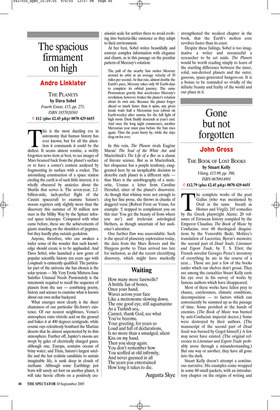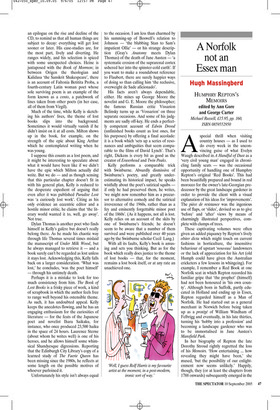Gone but not forgotten
John Gross
THE BOOK OF LOST BOOKS by Stuart Kelly Viking, £15.99, pp. 390, ISBN 0670914991 ✆ £12.79 (plus £2.45 p&p) 0870 429 6655 The complete works of the poet Gallus (who was mentioned by Ovid in the same breath as Homer and Virgil); 245 comedies by the Greek playwright Alexis; 20 volumes of Etruscan history compiled by the Emperor Claudius; The Book of Music by Confucius; over 60 theological disquisitions by the Venerable Bede; Molière’s translation of Lucretius; Byron’s memoirs; the second part of Dead Souls; Literature and Export Trade, by T. S. Eliot; the French novelist Georges Perec’s inventory of everything he ate in the course of a year... Those are just a few of the books under which our shelves don’t groan. They are among the casualties Stuart Kelly casts his eye over in his survey of works by famous authors which have disappeared.
Most of these works have fallen prey to chance, carelessness, climatic conditions, decomposition — to factors which can conveniently be summed up as the passage of time. Some perished at the hands of enemies. (The Book of Music was burned by anti-Confucian imperial decree.) Some were destroyed by their authors. (The manuscript of the second part of Dead Souls was burned by Gogol himself.) A few may never have existed. (The original reference to Literature and Export Trade probably arose through a misunderstanding.) But one way or another, they have all gone into the dark.
Stuart Kelly doesn’t attempt a continuous narrative. His examples come wrapped in some 80 small packets, with an introductory chapter on the origins of writing and an epilogue on the rise and decline of the CD, to remind us that all human things are subject to decay: everything will get lost sooner or later. His case-studies are, for the most part, lively and diverting. He ranges widely, and his selection is spiced with some unexpected choices. Heine is juxtaposed with the Book of Mormon; in between Origen the theologian and Kalidasa ‘the Sanskrit Shakespeare’, there is an account of Faltonia Betitita Proba, a fourth-century Latin woman poet whose sole surviving poem is an example of the form known as a cento, a patchwork of lines taken from other poets (in her case, all of them from Virgil).
Much of the time, while Kelly is sketching his authors’ lives, the theme of lost books slips into the background. Sometimes it would virtually vanish if he didn’t insist on it at all costs. Milton shows up in the book, for example, on the strength of the epic about King Arthur which he contemplated writing when he was young.
I suppose this counts as a lost poem, and it might be interesting to speculate about what it would have been like if we didn’t have the epic which Milton actually did write. But we do — and as though sensing that this particular chapter doesn’t fit in with his general plan, Kelly is reduced to the desperate expedient of arguing that even after it was published Paradise Lost was ‘a curiously lost work’. Citing as his only evidence an eccentric editor and a hostile minor critic, he claims that ‘the literary world wanted it to, well, go away’. Not true.
Dylan Thomas is another poet who finds himself in Kelly’s galère but doesn’t really belong there. As he made his chaotic way through life Thomas several times mislaid the manuscript of Under Milk Wood, but he always managed to retrieve it — and a book surely can’t be regarded as lost unless it stays lost. Acknowledging this, Kelly falls back on a larger consideration. ‘What was lost,’ he concludes, ‘was the poet himself’ — through his untimely death.
Perhaps it is a mistake to look for too much consistency from him. The Book of Lost Books is a frisky piece of work, a kind of scrapbook in which the author feels free to range well beyond his ostensible theme. As such, it has undoubted appeal. Kelly keeps the anecdotes flowing, and he has an engaging enthusiasm for the curiosities of literature — for the feats of the Japanese poet and novelist Ihara Saikaku, for instance, who once produced 23,500 haiku in the space of 24 hours. Laurence Sterne (about whom he writes well) is one of his heroes, and he allows himself some whimsical Shandyesque digressions. Reporting that the Edinburgh City Library’s copy of a learned study of The Faerie Queen has been missing since the 1980s, he reflects at some length on the possible motives of whoever purloined it.
Unfortunately his style isn’t always equal to the occasion. I am less than charmed by his summing-up of Boswell’s relation to Johnson — ‘the blubbing Stan to Sam’s impatient Ollie’ — or his strange description (Gray’s Anatomy meets Dylan Thomas) of the death of Jane Austen — ‘a systematic erosion of the suprarenal cortex ushered her into the spinster-cold earth’. If you want to make a roundabout reference to Flaubert, there are surely happier ways of doing so than calling him ‘the reclusive, overweight de Sade aficionado’.
His facts aren’t always dependable, either. He mixes up George Moore the novelist and G. E. Moore the philosopher; the famous Russian critic Vissarion Belinsky turns up as ‘Vossarion’ on three separate occasions. And some of his judgments are sadly off-key. He ends a perfectly competent account of Edwin Drood (unfinished books count as lost ones, for his purposes) by offering a final accolade: it is a book which ‘sets up a series of resonances and ambiguities that seem comparable to the films of David Lynch’. That’s right, Dickens is every bit as good as the creator of Eraserhead and Twin Peaks.
Kelly performs a comparable trick with Swinburne. Absurdly dismissive of Swinburne’s poetry, and greatly underestimating its historical impact, he speaks wistfully about the poet’s satirical squibs if only he had preserved them, he writes, ‘we might now remember him as a precursor to alternative comedy and the satirical irreverence of the 1960s, rather than as a fey and eminently forgettable minor poet of the 1860s’. (As it happens, not all is lost. Kelly relies on an account of the skits by one of Swinburne’s friends; he doesn’t seem to be aware that a number of them survived and were published over 40 years ago by the Swinburne scholar Cecil Lang.) With all its faults, Kelly’s book is amusing and sets you thinking. But as for the book which really does justice to the theme of lost books — that, for the moment, remains a lost book itself, or at any rate an unachieved one.

























































 Previous page
Previous page